Premium Only Content
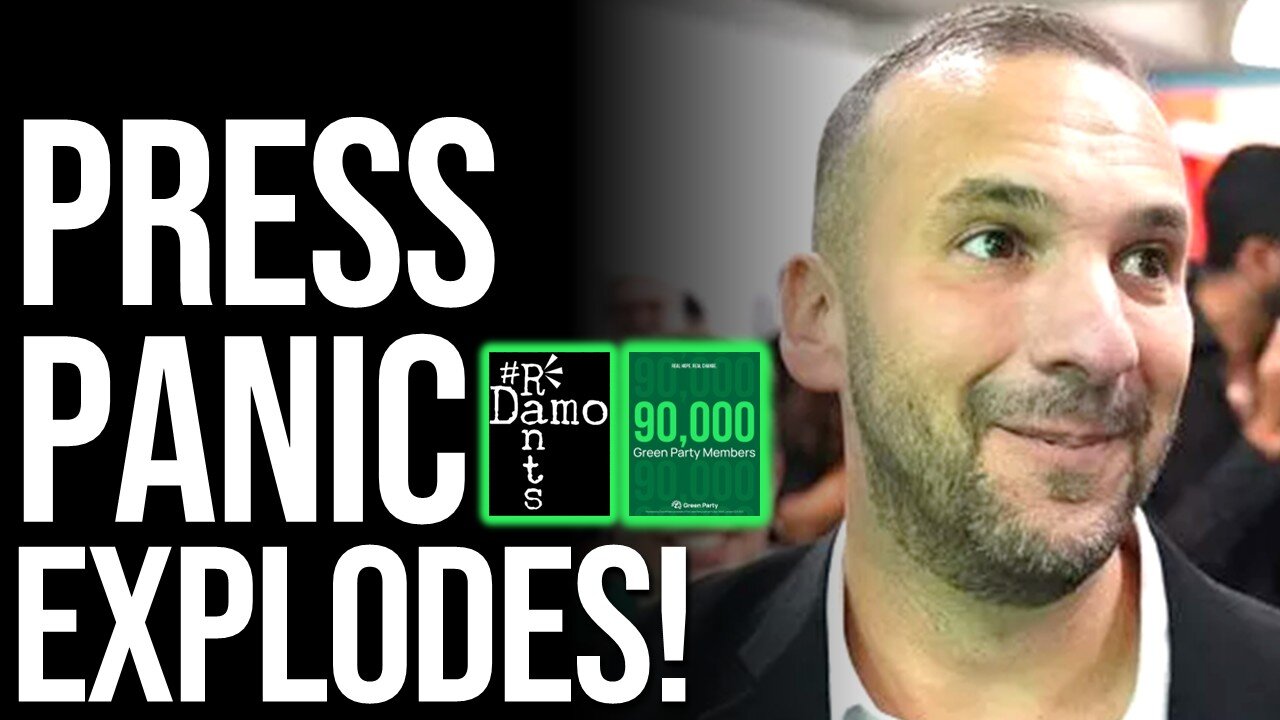
Zack Polanski Terrifies the Establishment — And They’re Panicking
Right, so it’s almost funny watching Britain’s establishment remember what panic feels like isn’t it? For years, the Green Party could have announced a plan to power the country with unicorn tears and it wouldn’t have made page twelve. Then Zack Polanski showed up, had the temerity to get himself elected leader and started telling a few home truths about wealth, justice, and decency, and suddenly the tabloids are in meltdown. The Express calls them “Putin’s Communists” now. The Torygraph calls him “a menace.” TalkTV goes full pantomime, with Darren Grimes and Kevin Sullivan sneering about his Jewish name change — a smear so clumsy and frankly racist it practically recruits for him. And through it all, Polanski just laughs. Because the moment Britain’s right-wing commentariat starts screaming “dangerous” at the only people still talking about fairness, you know they’re running scared. Hope, it turns out, has finally become subversive again.
Right, so the screen fades from black into the Green Party’s new broadcast, called Let’s Make Hope Normal Again.
No studio gloss. No slogans about growth or greatness. Just Polanski talking about us, people — real, tired, honest people just trying to get by — talking about what they still want this country to be. What they hope it to be. He explained what he wanted to do, but more importantly exactly how it worked and exactly how it benefits everyone, rich and poor alike to reset this country in terms of fairness.
Something unusual has happened as a result though. A three-minute political broadcast, made on a shoestring budget, its just Polanski talking in an ordinary street at dawn has cut through a decade of political numbness and forced Britain to feel again. Within forty-eight hours of airing, the Green Party’s membership was rising at a rate of three thousand a day. Within a week, it had passed ninety thousand — up twenty thousand in the month since Polanski became leader.
But how did a single broadcast turn Britain’s smallest national party into the establishment’s biggest political headache?
Because this time, the right people panicked.
The Daily Express declared that the Greens were “the party even more dangerous than Starmer’s Labour — the UK’s answer to Putin’s Communists.” The Telegraph called their new leader, Zack Polanski, “a menace” and “deluded.” Yahoo News accused the Green conference of “capturing everything wrong with the modern Left.”
And then, when TalkTV’s Kevin Sullivan and Darren Grimes tried to smear Polanski personally — mocking him for changing his name from David Stephen Paulden, implying he had done so for “showbiz effect” — the pattern became unmistakable. They ignored the truth: that his family had anglicised their Jewish name to escape antisemitism, and that Polanski had reclaimed it as an act of pride in his heritage. It was not an attack on vanity; it was an attack steeped in the very prejudice his family once fled and which we’ve seen weaponised to death by too many politicians and here is the right wing media joining in too, because doing some actual research before opening their gobs seems too much like effort.
This was no longer routine hostility toward a small party. It was a full-spectrum backlash — class contempt, cultural paranoia, and in this case, antisemitic dog-whistling — triggered by something Westminster and Fleet Street can no longer control: some moral clarity.
To understand the scale of the reaction, it’s necessary to understand the silence that preceded it.
By the middle of 2025, British politics was running on managerial autopilot. Labour, under Keir Starmer, had become an instrument of authoritarianism and spending aution. The Conservatives were shattered and still are and Reform UK was indulging in populistic performative outrage on repeat. The Liberal Democrats were as per usual functionally invisible, much like whatever it is they allegedly stand for. Every major party spoke the same language of restraint, responsibility, and compromise. Everything’s awful, we offer you no hope.
The press reflected that vacuum. Policy was covered as arithmetic, not ethics. “Caution” became the new patriotism. In that landscape, the Green Party — even as it talked about inequality, energy renationalisation, and rent controls — remained politically inaudible.
When Zack Polanski took over the leadership last month, he inherited a party that was policy-rich but unheard. His response was not to moderate its message but to simplify its purpose: a party that would talk about fairness as plainly as others talk about finance.
At the Bournemouth conference that has just finished, he spelled it out. Britain, he said, was being “poisoned by wealth.” The top one percent hoarded assets while the Bank of England handed £20 billion a year to commercial banks in interest payments. That figure was confirmed in the Financial Times. He argued that ending those payments and taxing accumulated wealth could fund public housing, renewable energy, and living wages. The logic was exact, the tone unflinching.
And yet, the story barely registered. Until the party released Let’s Make Hope Normal Again.
The film’s impact lay in its normality. It avoided the clichés of climate advertising — no polar bears, no despairing children, no moral sermon. It replaced guilt with solidarity. Ordinary people had spoken to Polanski about rent, care work, clean air, dignity. It wasn’t a commercial; it was testimony.
When the video dropped at the close of the conference, it spread faster than anything the party had ever produced. It was shared hundreds of thousands of times across X and TikTok and has now racked up millions of views.
Inside party HQ, the data confirmed what the comments suggested: one thousand new members per day became three thousand. This week, the Greens have now crossed ninety thousand members. People just last week were talking about 100,000 by Christmas. Now they’re talking we could get there in days now.
The film worked because it did not flatter; it levelled. It reminded people that politics is meant to represent them, not market to them. It treated hope not as sentiment but as resistance.
The establishment’s answer to that, much as we saw with Corbyn’s Labour, was hysteria.
Tim Newark in the Daily Express set the tone particularly low, but it is the Express, more comic than news, calling the Greens “dangerous” and comparing them to “Putin’s Communists.” The claim was factually meaningless but politically revealing. Russia’s regime imprisons environmentalists. Britain’s Greens are environmentalists. But the headline wasn’t meant to inform; the Express rarely does, it was meant to trigger a reflex.
The Telegraph echoed it with its own moral panic: “The Greens’ new leader is a menace,” “woke,” “deluded.” Yahoo News followed with an opinion piece insisting the Green conference “captured everything wrong with the modern Left.”
Then came that TalkTV segment, which I found the most offensive. Sullivan and Grimes — two pundits whose careers depend on outrage — mocked Polanski for “rebranding” himself, implying that he had changed his name to sound exotic. The real story, ignored on air, was that Polanski’s grandparents had changed their surname from Polanski to Paulden to hide their Jewish identity in a country that made them fear for it. He had reversed that change as an act of reclamation. The insinuation was not just false; it was antisemitic in the most predictable way — accusing a Jewish man of deceit for taking pride in being Jewish.
This was the right-wing media’s fallback strategy: when moral attack fails, smear identity.
And it backfired.
Within hours, the clip circulated on social media with the original family history attached. Thousands of comments pointed out what the segment had exposed — that the same broadcasters who weaponise accusations of antisemitism against their opponents indulge in it themselves when it serves their side.
The panic had turned into humiliation.
Why such ferocity though? Because the Green surge threatened the ecosystem that sustains Britain’s press.
Five corporations control more than ninety percent of national print circulation. Their profits depend on advertisers and investors in finance, real estate, and fossil fuels — precisely the sectors most threatened by Green policy. When a political movement calls for taxing wealth, capping rents, and ending oil subsidies, it is not simply proposing reform; it is threatening their revenue model.
The tabloids’ panic was not ideological; it was economic. Newark’s column was, in essence, a shareholders’ statement. The idea of a party shifting fiscal power from banks to citizens is intolerable to those whose business depends on the opposite.
That is the real grotesque excuse behind the coverage. The moral panic was camouflage for the material interests of the mainstream media’s benefactors.
Polanski refused to play the role assigned to him. He did not respond with outrage. He responded with ridicule. His post on X — “I’m never actually going to need to write another comment piece again, am I? The right-wing s*it-rags are just going to keep recruiting for us.” — landed like a punchline that everyone already knew the setup for.
It worked because it named the power dynamic directly. The media could attack him, but in doing so they confirmed his point. The more they called hope dangerous, the more they proved how hollow the establishment had become.
The humour was not decoration; it was strategy. It broke the feedback loop of outrage and replaced it with contempt. His supporters laughed with him, not at him.
At Green Conference in Bournemouth, Polanski’s message was blunt. He warned that “authoritarian alarm bells” were ringing in Britain — the criminalisation of protest, the normalisation of surveillance, the politicisation of policing. ITV News led with that quote because it captured a reality too many politicians now avoid: that authoritarianism can arrive in administrative form.
He linked that erosion of liberty to economic inequality — the logic that when citizens are stripped of agency, they stop expecting accountability. The argument connected ecology, economy, and democracy in one line of causation.
The effect was startling. For the first time in a decade, a political leader was speaking in moral language without sanctimony. He was treating fairness as a matter of security, not charity.
That return to moral politics — direct, factual, ethical — is what broke the media’s composure. Britain’s press has long depended on a political class that confuses competence with virtue. Polanski refused that distinction.
So here we are in the second week of October and Green Party membership has exceeded ninety thousand.
The data from YouGov confirmed that the surge translated into public perception. In London, the Greens have overtaken Labour as the most popular party and among voters under forty, they led by a wide margin.
The effect was measurable, but the significance was moral. It proved that when cynicism collapses, people re-enter politics, they re-engage.
The party’s core proposals — taxing the top one percent having explained exactly who they are in that political broadcast, ending the Bank of England’s annual subsidy to commercial banks, benefits for banks as that functionally is, enforcing rent controls, recognising international law in Gaza — were not radical by European standards. What made them explosive in Britain was their honesty.
And honesty, in a political system that addicted to euphemism, ends up coming across as revolutionary.
This is not the first time Britain’s establishment has mistaken sincerity for subversion. When Jeremy Corbyn led Labour, his call for redistribution was painted as extremism. The press turned morality into a threat.
The difference this time is tactical. Polanski learned from that collapse. Corbyn tried to argue his way out of the smear cycle; Polanski jokes his way through it. He treats outrage as validation, not crisis.
The effect is subtle but decisive. It denies the media the satisfaction of control. Every attack becomes evidence of relevance. Every smear becomes a signal that the right people are nervous.
Across Europe, movements connecting climate and class are gaining traction. Germany’s eco-left, France’s NUPES alliance, Spain’s Podemos — all translate environmental survival into social justice. The British Greens now occupy that same space.
The difference is their adversary. Britain’s press is uniquely concentrated and uniquely hostile. More than ninety percent of circulation sits under five owners, many with direct financial interests in the industries the Greens would regulate. So the hostility is not ideological; it is defensive capitalism in print. It is mainstream media rallying to protect their own interests.
That concentration makes the Greens’ breakthrough even more significant though. Their success came without those gatekeepers, powered by decentralised networks and peer-to-peer communication. Let’s Make Hope Normal Again reached millions not through the broadcasters but through people sharing it voluntarily across social media.
It was proof that post-media politics can work — that persuasion no longer depends on permission from them.
When the Express compared the Greens to “Putin’s Communists,” it did so not out of conviction but out of habit. Fear is the currency of a dying media model. Outrage drives clicks; calm does not.
But this time, the fear campaign exposed itself. The contradictions were visible in real time. Russia persecutes environmentalists; the Greens are environmentalists. The premise collapsed on contact with facts.
Readers noticed. Screenshots of the headline circulated alongside comments mocking its absurdity. Instead of inoculating the public against Green politics, the press vaccinated it against tabloid manipulation. Something we on the left certainly are more aware of now because of what happened to Corbyn.
That feedback loop — attack, ridicule, exposure — is now built into Britain’s political ecosystem. The more the tabloids overreach, the more they discredit themselves.
The Green surge is not merely organisational; it is diagnostic. It reveals how empty Britain’s moral centre has become.
For years, the political class has treated decency as a branding exercise. The Greens have reintroduced it as a political argument. They have reminded voters that fairness, transparency, and truthfulness are not luxuries — they are the essence of good governance.
That shift is contagious. Every hostile headline amplifies it. Every smear confirms it.
The emotional core of this movement is not idealism but exhaustion. A generation raised on crisis — climate, housing, wages — has spent years trapped between despair and distraction. The Greens offer an escape route: through participation. It seems a good time to join them therefore.
By linking ecological survival to economic fairness, they turned private fear into public purpose. That transformation — climate anxiety into climate agency — explains the velocity of their growth. People joined not because they expected to win tomorrow, but because for the first time in years, someone was speaking truth without apology.
The real story of this moment is structural. For most of modern history, Britain’s print media decided what counted as serious. That monopoly is gone. A single well-made video can out-perform a week of front-page coverage.
The Green Party proved it. The Express and Telegraph still reach a lot of people, but they can no longer dictate the frame.
The old power to define “normal” is slipping away.
That is why the word “dangerous” keeps reappearing in their coverage. They mean it. Polanski and his party are dangerous — to the system that privileges wealth, to the press that protects it, and to the cynicism that excuses it.
The antisemitic smear, the “communist” headline, the “menace” column — all of them expose the same anxiety. The Greens have made morality politically contagious again, and that contagion threatens those who profit from apathy.
If “danger” means making people believe things can change, then yes, the Greens are dangerous.
Two months ago, the Greens were arguably a parliamentary afterthought. Today they are a test of conscience.
Their membership figures are measurable; their cultural impact is harder to quantify but impossible to miss. They have turned mockery into mobilisation, hostility into evidence, and cynicism into recruitment.
Zack Polanski has not reinvented politics. He has re-introduced honesty. He speaks with the rhythm of someone who knows that the audience already understands the problem — they just need permission to admit it.
Let’s Make Hope Normal Again was not branding; it was a redefinition of normal itself. It declared that integrity is no longer naïve and that decency is not decorative.
That, more than any policy, is what terrifies Britain’s establishment press. Because if people start to believe that hope is rational, then the whole architecture of despair — the cynicism, the mockery, the moral blackmail — it all falls apart.
They called the Greens dangerous. They were right. They are dangerous to the idea that nothing better is possible.
And in Britain’s present political desert, that is the most revolutionary danger of all. So if you’re feeling revolutionary, you know what you need to do.
For more on what went down at Green Party Conference, the policy positions, and what set the Greens under Polanski’s leadership team apart from every other party now, do check out this video recommendation here as your suggested next watch.
Please do also hit like, share and subscribe if you haven’t done so already so as to ensure you don’t miss out on all new daily content as well as spreading the word and helping to support the channel at the same time which is very much appreciated, holding power to account for ordinary working class people and I will hopefully catch you on the next vid. Cheers folks.
-
 DVR
DVR
BonginoReport
2 hours agoDems Take Credit For Ceasefire, Blame Trump - Nightly Scroll w/ Hayley Caronia (Ep.155)
13K14 -
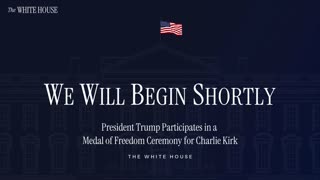 1:11:30
1:11:30
Turning Point USA
3 hours agoCharlie Kirk Receives The Medal of Freedom at The White House | 10.14.2025
154K60 -
 LIVE
LIVE
SpartakusLIVE
38 minutes agoLIVE from SUPER SECRET, VIP Location || BEACH FRONT into Verdansk
326 watching -
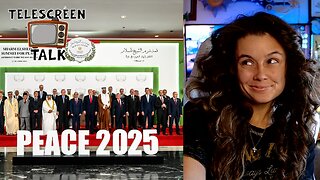 UPCOMING
UPCOMING
Mally_Mouse
7 hours ago📣Telescreen Talks - LIVE!
302 -
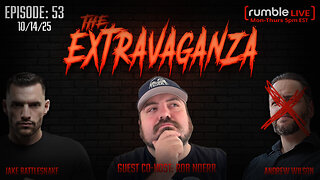 1:06:24
1:06:24
TheCrucible
2 hours agoThe Extravaganza! EP: 53 with guest co-host Rob Noerr (10/14/25)
12.8K14 -
 1:31:12
1:31:12
Kim Iversen
2 hours agoMAYDAY! America’s Food System Is Collapsing — And Trump Thinks CHINA Will SAVE Us?
20.5K54 -
 LIVE
LIVE
StoneMountain64
6 hours agoBattlefield 6 Sniping and Unlocking SNIPERS from LONG RANGE
107 watching -
 LIVE
LIVE
GritsGG
52 minutes agoSolos! Most Wins in WORLD! 3734+!
89 watching -
 3:59:54
3:59:54
Right Side Broadcasting Network
6 hours agoLIVE REPLAY: President Trump Participates in the Charlie Kirk Medal of Freedom Ceremony - 10/14/25
117K33 -
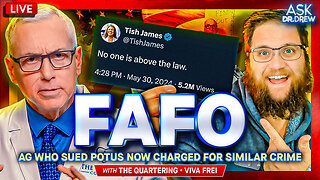 1:05:00
1:05:00
Dr. Drew
6 hours agoLetitia James Just Found Out "No One Is Above The Law" In Spectacular Display Of FAFO w/ Viva Frei – Ask Dr. Drew
43.1K18